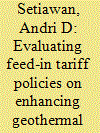|
|
|
Sort Order |
|
|
|
Items / Page
|
|
|
|
|
|
|
| Srl | Item |
| 1 |
ID:
186452


|
|
|
|
|
| Summary/Abstract |
Geothermal is vital for sustainably meeting Indonesia's energy demand, given its estimated massive reserves potential equivalent to 24 GW of electricity. The Indonesian government has set geothermal contributions to the national energy mix at 7,241.5 MW by 2025 and 17,546 MW by 2050, despite harnessing such vast potential needing significant investment. To that goal, the government established a feed-in tariff (FIT) mechanism to encourage private sector investment in geothermal development. However, FIT has undergone significant alterations in a short period. Moreover, various complicating factors—bureaucracy, social, and technical—exist alongside FIT implementation. Therefore, the extent that FIT can effectively enhance geothermal development in Indonesia should be challenged with further investigation. This study explores the efficacy of FIT policies for geothermal electricity by comparing the performance of several FIT schemes in terms of their impact on the government's target achievement. This study combines the policy analysis framework with system dynamics modeling to understand the dynamic interaction of FIT policy and other important components in geothermal development. The findings show that modest bureaucracy and public support are required. Furthermore, to enhance geothermal development more effectively, FIT should be at least 11 cents US$/kWh and accompanied by technical breakthroughs and government-funded exploration activities.
|
|
|
|
|
|
|
|
|
|
|
|
|
|
|
|
| 2 |
ID:
125632


|
|
|
|
|
| Publication |
2013.
|
| Summary/Abstract |
Carbon capture and storage (CCS) is being considered as an option to reduce CO2 emissions worldwide. Yet recent cases show that CCS faces divergent public acceptance issues. This paper investigates stakeholder perspectives on CCS in Indonesia. Q methodology was adopted to analyse the diversity of stakeholder perspectives. Four perspectives were identified: (1) "CO2 emissions reduction through clean energy sources rather than CCS"; (2) "CCS as one of the options in the transition to a sustainable energy system"; (3) "CCS as the only optimal solution to reduce CO2 emissions"; (4) "CCS is only a tactic to keep burning coal forever". Based on these results, we argue that stakeholder acceptance of CCS should be understood as a complex notion. This means that understanding whether or under what conditions stakeholders would be willing to support CCS, requires consideration of stakeholders' viewpoints about broader questions of CO2 emission reduction and energy supply in Indonesia, rather than studying attitudes towards CCS in isolation. We discuss how the approach taken in this study can be used and followed up in policymaking on CCS in Indonesia.
|
|
|
|
|
|
|
|
|
|
|
|
|
|
|
|
| 3 |
ID:
171489


|
|
|
|
|
| Summary/Abstract |
Natural gas vehicles (NGV) face significant adoption barriers in Jakarta. Therefore, a successful transition requires measures from the government. Owing to the high cost of transition policies, the efficacy of these policies must be analyzed to identify the most effective policy. The implementation of transition policies, however, could dynamically influence people's perception and behavior, which then changes the landscape of adoption barriers. Furthermore, even a seemingly successful policy may fail when a certain pathway of uncertainties emerges in the future. To address these concerns, we integrated agent-based modeling, exploratory modeling, and diffusion of innovation theory into the exploratory model-based diffusion analysis approach. This approach evaluates the policy's performance, explores changes in the relative importance of different adoption barriers, and identifies policy vulnerabilities, i.e., scenarios leading to policy failures. We tested this approach on four NGV transition policies targeting three adoption barriers. We found that the importance of adoption barriers and the critical uncertainties upon the implemented policies. The social–behavioral barrier predominates under current conditions, whereas the economic factor becomes more relevant when all policies are executed. Understanding the changes in adoption barriers and policy vulnerabilities will help decision-makers to prepare additional measures that ensure a successful transition.
|
|
|
|
|
|
|
|
|
|
|
|
|
|
|
|
|
|
|
|
|